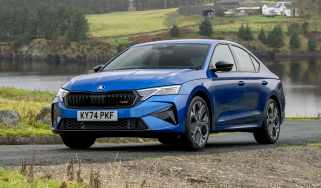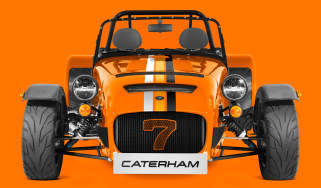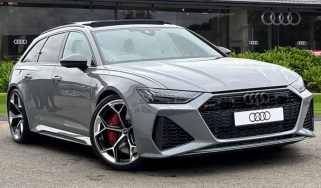How to drive on track: trackday driving masterclass
Our Joy of Driving series concludes with a look to the place where there are no speed limits and you can drive your car to its limits – or yours
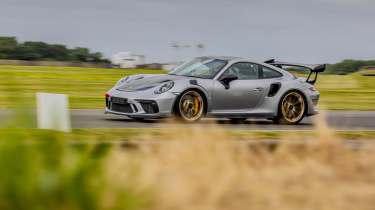
Trackdays are a place where you can push your car and your driving further than you can ever do legally on the road, in a safe, marshalled environment, surrounded by like-minded drivers. You need to ensure you come with the right attitude, though. Trackdays are not race days or test days – lap timing is not permitted and aggressive driving such as late lunge braking or blocking will get you a chat with the organisers and possibly kicked off. The same goes for smokey drifting, no matter how stylish. Trackdays are simply an opportunity to hone your car control and get to understand your car’s dynamics and limits better. To drive some of Britain's most iconic circuits for yourself, secure your evo Trackdays ticket.
Listen carefully at the briefing. This will tell you the protocol for overtaking – usually only on the straights, often only with the consent of the car in front – and what flag signals will be used. If it’s your first time on track or you’re at a circuit you’ve not driven before, a top tip is to drive it on a computer driving game beforehand if you can. This will establish the sequence and difficulty of corners and general speeds. On track for real, use your first session to establish the lap in your head and build speed gradually. Start with conservative brake points and, as on the road, use smooth steering inputs, slick, unhurried shifts and calm, progressive braking inputs to establish a flow, get into a rhythm. Try to maintain this smoothness as you build your pace. If you’re comfortable with heel-and-toe downshifts or left-foot braking, bring these techniques in early.
> Click here to book evo Trackdays 2025 tickets
An excellent way of getting a deeper understanding of a circuit is to book tuition, if it’s offered. Instructors are often seasoned racers who know the circuit inside out and can explain the best lines, suggest how to get the most from your car and offer tips on your driving.
Drive at your own pace and let everyone else do the same. Try not to get sucked into driving faster to keep up with a car which you know has less performance, and always have a little in reserve, a safety margin. In the same vein, at the end of the day, avoid going for ‘one last lap’; concentrating on lines, braking points and corner-exit traction – and watching your mirrors vigilantly – for a whole day can be exhausting.
In cars with stability control, it’s a good idea to start with everything switched on, particularly if the track is wet, so you can establish the level of grip in the corners and under braking. The feeling of the stability control system intervening lets you know where the power is likely to exceed the grip. As your confidence and familiarity with the track build, you can slacken off the stability control progressively and take more responsibility for traction, learning to feel where the limit of grip is and how to manage the car’s dynamics just over the limit.
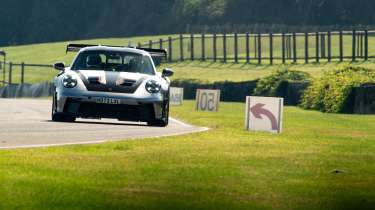
Often, there will come a point where the systems seem to be holding back the car unnecessarily. Be aware that if you turn everything off to stop the car bogging down out of a tight corner, it will also not be there in a faster turn where you perhaps hadn’t noticed its intervention, so tread carefully.
As far as your car is concerned, ensure it is in good shape before the day: serviced, no oil leaks, no suspension clonks, healthy brakes and tyres. Ensure all vital fluids are at the correct level – engine oil and coolant, brake and clutch fluid – and check that your tyres are at the correct pressures (use the higher pressures if there’s a handbook recommendation for high speed/high load). Fit the towing eyes when you arrive at the track. Be aware that the noise limit varies from circuit to circuit and day to day. Once you’ve had your car tested, make a note of its reading for future days, and if you’re close to the day’s limit, it can help to get an idea of where the noise meters are.
> How to prepare your car for a track day
Bring spare oil with you and keep an eye on fluid levels during the day. A tyre pressure gauge and pump can be very useful too. Add them to a pre-trackday checklist that includes your helmet and removing any loose objects from the cabin and boot. You’ll probably be asked to wear a long-sleeve top when on track too.
Out on track, listen to and feel what the car is telling you. If grip starts to drop away, your tyres are probably getting too hot. The alternative is that a car has dropped some fluid – or it could be your car doing the dropping, so keep an eye on the mirrors for smoke or steam, on marshals’ posts for waved flags, and also on the instruments for warning lights or unusual readings. If you think it’s your car dropping fluid, get off track as soon as is safely possible.
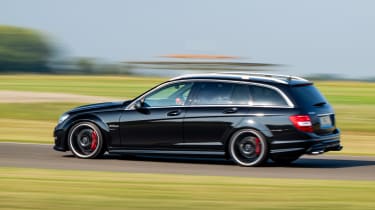
If the brake pedal goes soft and stopping power drops off, your brakes are getting too hot, ditto with rumbling brakes. Drop your pace and do a couple of laps to get cooling air over the brakes and bring temperatures down, all the time keeping an eye on the mirror for faster cars wanting to overtake. When you’re back in the paddock, leave the car in gear rather than applying the handbrake – clamping the pads to stationary hot discs can stick them together.
The bigger and heavier your car is, the more a trackday will take out of its tyres and brakes. You can help the performance and life of your tyres significantly by managing their pressures. After three or four quick laps, come in and check the pressures. If they are up, drop them back down to the recommended values. Be aware that between sessions they will cool down and the pressures will drop, so at the start of each session it’ll take a couple of laps to build temperatures and pressures again.
Remember you’ll want legal tread levels on the tyres and strong brakes for the drive home at the end of the day. Don’t forget to return the tyres to their road pressures for the drive home too – and adjust your attitude back to road driving and speed limits.
Improving your circuit driving technique
Steering
Steering is the first and most important and you can conduct a little experiment to prove it to yourself. Find a deserted car park or area of tarmac where there’s nothing to hit and no kerbs or bits of broken concrete or the like, and preferably with a wet surface to save the machinery a bit. Drive along at 30mph and knock the car into neutral. Then wind the wheel as fast as you can. It depends on the car but it is almost certain that it will head straight on, losing speed, then after a few yards will reluctantly start to turn. Now repeat the exercise and instead of frantically piling on the lock, just ease the wheel as if you were turning into your drive. The car will dive in the direction you point it with an alacrity so far removed from the time before that you might have fitted a different set of tyres. The difference is utterly startling.
Now in the cold and analytical armchair of life, this is something that almost every driver with any interest in the process knows only too well. But it is also true that half of them will use the former technique rather than the latter and it is because the thought processes are running more slowly than the events unfolding beneath the wheels, and the driver is trying to catch up. Steering is something that we will deal with in greater depth later in this series but for the moment, just think about the effects of the little demonstration and practise easing the wheel rather than jerking it. You should also be looking ahead up the road, rather than staring at the piece in front of you. This will feed the brain with information as to the nature of the corner and then it won’t come as a surprise. It will also feed the tyres with information, something which is fantastically important and which we will also return to later.
> Track days: everything you need to know
Braking
Next is braking and it is another thing you can research in the car park, but before you do, consider what happens when you press that middle pedal. The car is travelling forwards (hopefully) so when you retard the wheels, the weight goes forwards. More weight is effectively added to the front and this gives the front tyres more to deal with. But because the actual weight of the car hasn’t altered during the manoeuvre – it’s only the distribution – the effective amount that has been added to the front has to come from somewhere and it’s the rear. The rear tyres then have less to press them to the road.
If adding weight to the front tyres is a bad thing then surely reducing weight at the rear is a good one because it gives the tyres less to do. Which is true, but less load also makes them more likely to lock which is the key thing. Conversely, more load at the front won’t necessarily lock the front wheels, but it gives a tyre more to do when it is about to be asked to steer the car.
Braking is the most difficult thing to do well in any car and yet another thing to be dealt with in greater depth, but for the moment, practice squeezing rather than stamping on them. Imagine there’s a soft-boiled egg on the pedal which you don’t want to burst. Any weight transfer that results from this and the way it makes itself felt via the layout and suspension geometry of the particular car will then happen more progressively and you stand a better chance of dealing with it.
Gear changing
Which leaves gear changing. Like the braking system, a modern transmission is now so vastly better than it was even 20 years ago that simply preserving it is less of an essential driving skill. Modern shifts are in general very light and positive and most will have a spring bias to guide the lever. Shift with fingertips and you won’t get the wrong hole because the box will do the work for you. Learn to heel and toe so the revs will be matched and the tyres won’t protest, but if you can’t – or the car needs some modification to suit your dainty plates – just be more considered about the shift. The time you take to do all this nicely will be more than compensated by the speed that comes from a settled car and an early application of power. – Mark Hales
This story was first featured in evo issue 333.

